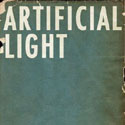
Artificial Light
by James Greer
Akashic Books

The frontman of a hugely popular, breakthrough band is found dead in his mansion from what appears to be a self-inflicted shotgun wound. By his body, however, a young woman has left 21 handwritten journals confessing her assistance in the high profile suicide. Mystery mixes with tragedy as the author, Fiat Lux, vanishes and no other trace remains to prove she ever existed. Inspired by that most famous suicide of the last decade, Spin writer and Guided by Voices author James Greer revisits the 90s alternative music scene in a debut novel that reads like a faux rockumentary commentated by a French Decadent poet.
The dead rockstar in Greer’s story is named Kurt C. and embodies the qualities you would expect the real Kurt to have possessed: gifted, sensitive, quietly charismatic, drug addicted and struggling with the unwanted celebrity of his band N_. [In many ways, Artificial Light makes the perfect companion read to the Gus Van Sant film, Last Days, since both could be reduced (but only if you wanted to miss the point entirely) to artistically superior re-enactments with many liberties taken as to filling in the holes of the authentic story.] Instead of Seattle, the setting is Greer’s former resident city, Dayton, Ohio, hometown of the Wright brothers and the book’s cast of Kurt followers and rock cliche-ridden scenesters. Fiat Lux, a silently observant librarian and barfly, introduces us to the drunks, groupies, and aspiring artists who follow Kurt after hours many a night to Albion, the decaying, eccentrically designed estate built by Orville Wright. Most wasted amongst this circle is Trip Ryvvers of Whiskey Ships, the almost famous band with a singer capable of disappearing two cases of beer in the course of one show.
While the core notebooks next to Kurt’s body are written by Fiat Lux, some are credited to Trip, who alternates between writing about the Wright brothers and about not writing about the actual book he’s under contract to complete, an insider’s look into the bands of Dayton’s alternative music scene. Other journals are supposed to be excerpts from Orville’s secret diary, in which he candidly pours out his insecurities, regrets, and the revelation that he was an opium addict, details no one can verify because the diary is missing along with Fiat. Still other scraps reveal the inner thoughts and experiences of different characters told from some unknown but seemingly omniscient narrator. As in a documentary or the satanically scary novel House of Leaves, Greer’s story is an assemblage of documents and points of view on the life, music, and death of the book’s pseudo subject. Artificial Light’s readers find themselves also cast collectively as a character — the audience of a real life murder mystery and possibly, a fan base searching for the answers behind the incomprehensible death of their legend.
Greer’s novel examines many kinds of death – the death of an icon, the death of all the wannabe icons, the death of their scene as well as that of its physical base, the postindustrial American city, and the most grievous one of all, the death of a dream. You can imagine Trip as the voice closest to Greer’s own: his character is trying to write about an already disintegrated music scene and numerous questions about the meaning of its birth and demise continue to weigh heavily on the minds of both. At length Trip meditates on how music rescued his generation from the lightless maw of Deadsville, America, for a while at least until its mainstream reincarnation turned around to gorge on its own brood.
If that last sentence seemed a bit much, I’m only preparing you for Greer’s maudlin poetic prose. While reflecting on the success of band N_, Trip weighs the impact which varies from beneficial to detrimental – how mainstream acceptance boosted and permanently disfigured the scene at the same time, how it gave birth to that most irksome moral dilemma of staying independent versus selling out, or why some bands are chosen for commercial success while others with perhaps more credibility remain overlooked. Not unfamiliar territory when rehashing 90s underground music, but suddenly Greer seems as if he’s channeling Baudelaire by spinning a maddeningly Tao-like metaphor for Trip’s mix of emotions: “the estranged night lay open, unchanged, immobile but strange, brushed by the gently ungently unyielding yielding of the moon … submerged emerged in the silent unsilent song, submerged emerged from the beauty and the magical unmagical unity.” I kept asking myself, is this good ungood writing? Either way, its overwrought tone suits the topic of someone choosing to die for the adolescent but virtually impossible ideal of artistic purity.
I’d be surprised if you either hate everything about this book or fall in love with its every line. Readers might enjoy the vulnerable honesty of the Wilbur Wright diary, while loathing the encyclopedic descriptions of Fiat’s favorite author. These latter sections recall the chapters in Moby Dick when Melville provides exhaustive detail about a minute facet of the whaling industry; it’s background information that only services the author’s particular obsession but unnecessary to the narrative and annoying to those readers who prefer to move along at a nice clip with the story. However, if you read for the same reasons as Fiat — reading for the sake of it, losing yourself in a book’s tributaries as much as following its main plot line, you’ll get along much nicer with Greer’s novel. As Fiat explains why she loves her rambling author, “there are spiraling stories within stories within stories.”












